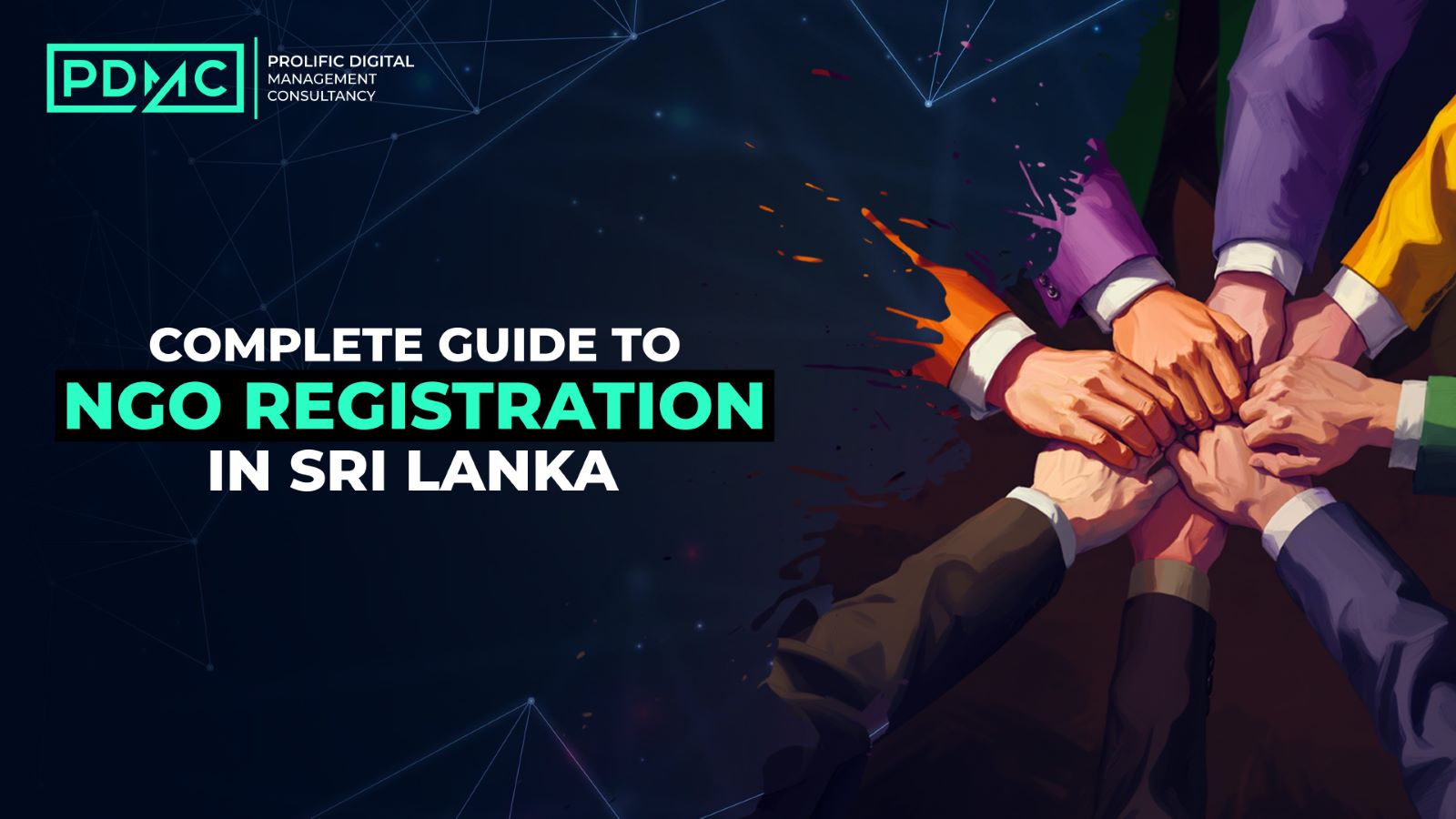Blog
Complete Guide to NGO Registration in Sri Lanka | Step-by-Step Process
9 Sept 2024
Setting up an NGO in Sri Lanka is a major task that involves going through several procedures to ensure that the organisation is legally compliant. The following is a step-by-step guide on how to register an NGO in Sri Lanka with a focus on compliance and legal registration.
What is an NGO?
An NGO is a non-profit making organisation formed by individuals with a common interest in addressing certain problems affecting society and coming up with solutions that will be of benefit to society. These organisations operate independently of government influence involved in different causes like education, health, environment and social causes. These can be local, national or international, some of the most recognised are the Red Cross, Amnesty International and Women in Need.
How to Qualify as an NGO in Sri Lanka
To qualify as an NGO in Sri Lanka, your organisation must meet specific criteria:
Purpose: Your NGO must have a clear and identifiable mission that is in the interest of the society, such as education, health, welfare or environment conservation.
Non-Profit: It must be an organisation of a non-profit making character, where all the income must be utilized to achieve the set goals and aims.
Registered Office: It is mandatory to have a registered office address within Sri Lanka.
Constitution: A written constitution or code of regulations that defines the purpose, aims and scope of the organisation is required.
Governing Body: There should be an executive committee or a governing body to be in charge of the management and running of the organisation.
Transparency and Accountability: The NGO has to keep proper records of all the financial transactions and prepare the financial statements.
Legal Compliance: The organisation has to comply with all the legal requirements such as tax laws and employment laws.
Official documentation: Registration of NGOs
Why Register Your NGO?
Registering your NGO in Sri Lanka provides several key advantages:
Legal Recognition: Registration provides your organisation with legal personality and this makes it easier to function and acquire resources.
Credibility: A registered NGO is considered to be more credible and dedicated to its goals and objectives, thus increasing the confidence of the donors and stakeholders.
Tax Exemption: Registered NGOs can be exempted from paying taxes and other charges, which will reduce the cost.
Funding Opportunities: The registered NGOs are allowed to seek funding from different sources such as grants, donations and international aid.
Resource Access: It also helps in better access to office space, equipment and training programs for registration.
Accountability: Registration enhances accountability and disclosure through the requirement of filing financial statements.
Bank Accounts: A registered NGO can open bank accounts in its name and thus the financial transactions are easier to manage.
How to Register an NGO in Sri Lanka
Registering an NGO in Sri Lanka involves two primary steps:
Registering your organisation as a Company Limited by Guarantee (CLG)
Applying to register it as an NGO.
This type of company does not have share capital or shareholders but it has members who give a guarantee of a certain amount of money in the event of winding up of the company. This structure is most suitable for organisations that are established to achieve social objectives as opposed to making profits.
Related: Pvt Ltd Company Registration in Sri Lanka: A Comprehensive Guide
Step 1: Incorporating a Company Limited by Guarantee
Reserve a Company Name: The first step is to register your company name with the Registrar of Companies. This can be done online through the Department’s website.
Prepare the Memorandum and Articles of Association: These documents contain the mission and the regulation of the running of your business. It is recommended that one should consult a lawyer to make sure that these are well prepared.
Prepare Other Required Documents: This includes Form 1 (Declaration of compliance with the Companies Act) and other special forms requested by the registrar.
Note: Please Use eROC System Generated Forms for Form 1.
Submit the Documents: All the documents that are required have to be filed with the Registrar of Companies and the appropriate fees paid. After the review, the Registrar will then issue a Certificate of Incorporation if all the requirements are met.
Obtain Necessary Approvals: In some cases, depending on the type of organisation, other approvals/licenses from other government departments may be required.
Register for Taxes: After Incorporation, your company have to register for taxes with the Inland Revenue Department to ensure tax compliance.

Step 2: Apply to Register Your NGO under Your Company Limited by Guarantee
After you have incorporated your Company Limited by Guarantee, the next step is to register your NGO under it by applying to the National Secretariat for Non-Governmental Organisations (NS-NGO).
This registration process can be completed online and involves the following steps:
Fill out Basic Information and Contact Details: Provide basic information about your NGO such as the name of the NGO, the address and the phone number.
Note: Make sure that the organisation is classified as an NGO and not an INGO (International NGO).
Registration with Other Institutes: Complete this step only if your NGO is already registered with another institute in the country.
Specify Objectives, Office Bearers, and Geographical Coverage:
Objectives: It is important to define the objectives of the NGO in question and state the concrete goals that it is to accomplish.
Office Bearers: List the names of key office bearers and their respective positions and terms of office.
Geographical Coverage: Specify the regions in Sri Lanka where your NGO will be active.
Define Subject Areas Covered by Your NGO: Choose the topics of interest that your NGO is involved with. If your activities do not fall under any of the mentioned categories, please indicate them under the “Any other” category.
Funding, Members, and Staff Information:
Funding Sources: Indicate whether your NGO’s funds are raised locally or internationally, in terms of capital and recurrent funding.
Members: Give the number of members in your NGO not the number of staff.
Staff: Detail the number of staff, including both administrative and program roles and indicate if they are permanent or temporary.
Funding Agencies: Provide the details of any agency that funds your NGO such as their physical address, phone numbers, and email addresses.
Head of the Organisation: Provide the name and designation of the head of your NGO and his/her contact details.
Key Staff Positions: Detail the key posts in your organisation, whether these are based in the head office or field, and whether these are permanent or contractual.
Additional Details and Final Declaration: Provide details of any assets owned by your NGO such as equipment, vehicles or any other properties. There must be a person who affirms the truthfulness of all the information given, including the details of the bank accounts that deal with the NGO’s money.
Active Members: List down the names and addresses of the active members of your NGO, their NIC numbers, their position in the NGO and their main source of income.
Once you have filled out these steps, you can submit your application online.
How Long Will It Take for NGO Registration?
After applying, a physical visit to the National Secretariat for NGOs is necessary for further discussions, along with a copy of your NGO’s constitution. The constitution defines the operational rules, roles, responsibilities, and powers within your organisation.
The overall approval process for NGO registration typically takes about 4-5 months. In this period, the Secretariat will consider your application and submit it to the Ministry of External Resources and the Ministry of Defence for their approval.
What’s Next After Registering Your NGO?
After registering your NGO, it is important to ensure that you adhere to the compliance.
Key steps include:
Bookkeeping: Make sure that all the financial transactions are recorded in the right manner. Consider outsourcing to an expert if necessary.
Related: Why Is Bookkeeping Important? Essential Tips & Benefits
Maintaining Audits: This is because audits help in making the financial statements to be transparent as a way of proving that the company has been audited.
Filing Tax Returns: In some cases, depending on the type of activities of your NGO, tax returns may be necessary. It is therefore important to consult the National Secretariat for NGOs to clarify these requirements.
Filing Annual Returns: Make sure that annual returns are filed every year to keep your NGO in operation.
Once you have registered your NGO, you should ensure that you comply with all the legal formalities and that your NGO is sustainable. This includes maintaining proper records, having the accounts balanced, filing tax returns and ensuring that all reports that are supposed to be filed annually are filed. As mentioned above, compliance does not only help your NGO to gain credibility but also in the search for more funding and support.
If you require our services for the registration of a Private Limited Company or any other services, kindly, get in touch with us for a free consultation. We are here to help you to build and grow your business successfully in Sri Lanka.





